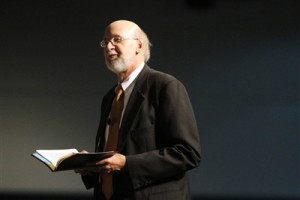Youth Ministry & The Primitive Church - Catechesis
 A few weeks ago I spent two days on the campus of Virginia Wesleyan College with Bishop Tim Whitaker. The retired United Methodist Bishop led a seminar about the mission of the church today. He used the primitive church (first 300 years) as an example of the church growing while not being the religion of the culture and at times being received hostilely.
The two day seminar walked the assembled group of United Methodist clergy (I'm not sure how I got in) through the history of the primitive church, the first 300 years after Christ's resurrection.
A few weeks ago I spent two days on the campus of Virginia Wesleyan College with Bishop Tim Whitaker. The retired United Methodist Bishop led a seminar about the mission of the church today. He used the primitive church (first 300 years) as an example of the church growing while not being the religion of the culture and at times being received hostilely.
The two day seminar walked the assembled group of United Methodist clergy (I'm not sure how I got in) through the history of the primitive church, the first 300 years after Christ's resurrection.
As I've been processing what Bishop Whitaker spoke about I have come to the conclusion that the primitive church has a lot in common with youth ministry. Today if you mention the phrase "Sunday School" in a room of youth pastors you will hear a collective sigh with a unison rolling of their eyes. Sunday School is something that at least in my youth ministry experience has been dreadful and always a point of unwanted stress.
Christian Formation - The Primitive Church Took This Seriously
At its basic level, Sunday School is Christian formation. It is an opportunity to share what it means to be a follower of Jesus in a context that students will understand at whatever given age they are. We can all remember the cute crafts of Noah's ark we made as kids and then later learning that the ark was more than just a boat, it was a life line that led Noah and his family to a rainbow signaling a new covenant. Sunday School is supposed to be the time when children, teenagers, and adults ALL learn about the Christian in a context that is appropriate for the stage of life they are in.
The early primitive church believe Christian Formation was important too. Christian Formation was a requirement of membership in the community. There was an expectation that you would know the basics of the faith prior to joining the community. This was done through a process called "Catechesis".
Catechesis is a fancy church word for a period of study people would go through prior to joining the church. Meaning, the faith was taught by word of mouth for the purposes of preparing people for baptism.
During this period of study, participants were permitted to attend worship services but were required to leave the service prior to the distribution of the Eucharist (for you United Methodist the Eucharist is Communion). The Eucharist was typically celebrated at every service and not reserved for the first weekend of the month.
In the arena of youth ministry I think we (professionals and laity) have dropped the ball in two regards here:
-
Overall, Christian Formation is secondary thought in youth ministry.
-
We have completely removed sacramental theology from youth ministry.
Ask anyone who works professionally in youth ministry and they will tell you that Sunday School is the one aspect of their ministry where they struggle the most. I have a love/hate relationship with Sunday School. On one hand I love it because there is an opportunity to share the faith at the most basic level. We remove the silly games and are left with the study of scripture. It is during this that students have an opportunity to really learn the basics of not only what it means to be a disciple of Jesus but also they have a chance to learn the overarching story of scripture.
I hate Sunday School because for most families it is an afterthought. They might encourage their child to attend Sunday School if there is time in the family schedule but for the most part parents themselves are not attending Christian Formation classes so why would you expect their teenager to do so?
If we really want students to know what it means to be a follower of Jesus, shouldn't we be just as passionate about teaching them the stories of scripture in addition to going on mission trips or attending church camp?
Second, I think we have done a disservice by removing sacramental theology from youth ministry. To be honest, in most cases we have removed the sacraments entirely. Unless you come from a Baptist or Non-denominational tradition teenagers are not baptized often in the church. On top of that, youth directors/pastors/volunteers in most mainline traditions are not allowed to preside over the Table. Senior Pastors are most times too busy to join in youth group or have outsourced youth ministry entirely to a younger leader. So not only are students not learning the basics of the faith but also they are not experiencing the Grace offered to us through the sacraments.
Youth ministry needs to return to the basics of the faith. We need to rethink how we share our stories and participate in the Grace-filled opportunities that are usually afterthoughts in youth ministry. How we expect this next generation of believers to understand what if means to be a follower of Christ if they are not being taught the basics of the faith? Let's look to the Catechesis of the primitive Church and go from there.